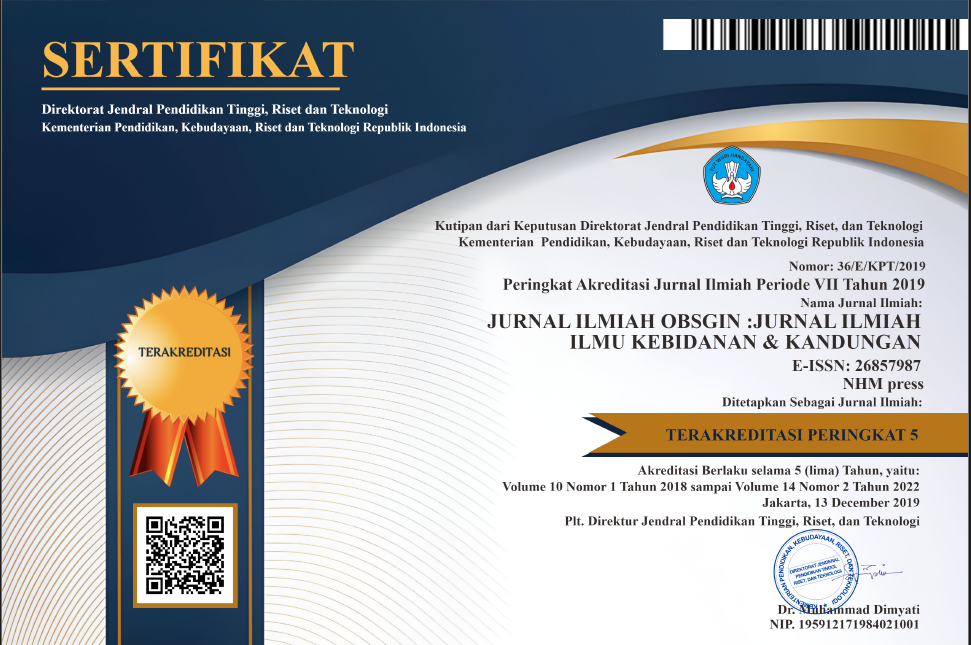The Effect of Giving Puzzle Game Method on Fine Motor Development in Preschool Children at Dharma Wanita Al-Mu'minah Kindergarten, Sembayat Gresik Village
Abstract
The stages of development experienced by a child include development in the fine motor aspect. Fine motor skills are part of a child's ability to observe and perform movements that involve only certain parts of the body with small muscles but require careful coordination. The purpose of this study is to determine the effect of the puzzle game method on fine motor development in preschool children at Dharma Wanita Al-Mu'minah Kindergarten, Sembayat Gresik Village. The design of this study uses Pre-Experimental (One Group Pre-post test). The population in this study is 119 preschool children. The sample taken was 46 children. The sampling technique is non-probability sampling by purposive sampling. Data collection uses KPSP Observation. The statistical test used is the Wilcoxon Signed Ranks Test. The results of the study showed that before being given therapy, the category was doubtful as much as 56.5% and 43.5% appropriate, after being given therapy, most of the 78.3% of children with fine motor development were appropriate. Based on the results of statistical analysis, a value (p=0.000 < 0.05) was obtained. The result of this study is that the provision of puzzle games can improve fine motor development in children. There is an effect of the puzzle game method on fine motor development in preschool children and it is hoped that teachers will further improve children's fine motor development by providing stimulation, one of which is providing puzzle games at Dharma Wanita Al-Mu'minah Kindergarten, Sembayat Gresik Village.
References
Hakiki, M., & Andarwulan, S. (2023). The Relationship between Parents' Knowledge of Growth and Development with the Development of Children Aged 4 – 6 Years. PROFESSIONAL HEALTH JOURNAL, 5(1). https://doi.org/https://doi.org/10.54832/phj.v5i1sp.451
Hamdanesti, R., & Oresti, S. (2021). Textbook for Early Detection of Child Developmental Growth with Kpsp and Denver II Examination. In Textbook (p. 74).
Harmila, Fetriyah, U. H., & Joae Brett Nito, P. (2023). Puzzle games affect the fine motor development of children aged 4-5 years. JKJ): Indonesian National Nurses Association, 11(3), 582–583. https://jurnal.unimus.ac.id/index.php/JKJ/article/view/12315/0
Maghfuroh, L. (2018). The method of playing puzzles has an effect on the fine motor development of preschool-age children. Journal of Endurance, 3(1), 55. https://doi.org/10.22216/jen.v3i1.2488
Maylasari, I., Rachmawati, Y., Agustina, R., Silviyana, M., Noviani, A., Sari, M., & Yugiana, E. (2020). Analysis of Early Childhood Development in Indonesia. https://www.bps.go.id/id/publication/2020/10/22/7318afd993e5483a36649b4d/analisis-perkembangan-anak-usia-dini-indonesia-2018-integrasi-susenas-dan-riskesdas-2018.html
Nikmah, N., Qomari, S. N., & Zainiyah, H. (2023). The Effect of Puzzle Games on Fine Motor Development in Children Aged 24-36 Months. Indonesian Journal of Professional Nursing, 4(1), 52. https://doi.org/10.30587/ijpn.v4i1.5773
Sary, Y. N. E., Ambarsari, N., & Suhartin, S. (2023). The Effect of Lego Games on Fine Motor Development in Children Aged 3-6 Years. Journal of Obsession : Journal of Early Childhood Education, 7(5), 6273–6280. https://doi.org/10.31004/obsesi.v7i5.5350











